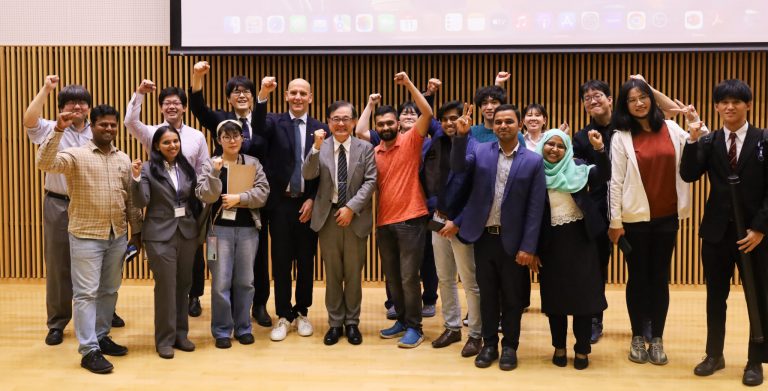President’s Column #4: Learning from the 150-year-old struggles of our great predecessors

Every year in this season of autumn, a cross-departmental symposium of Hokkaido University is held. The ninth symposium was successfully conducted this year on October 11th. Since I became the President in 2020, we have invited a Nobel laureate to give a special lecture every year. In the past three years, the lectures were given online, but this year we were able to invite Professor Benjamin List, the 2021 Nobel laureate in Chemistry and a specially appointed professor at our university, who came from Germany to give an in-person lecture.
My area of expertise is clinical medicine, which is different from those of the four invited Nobel laureates—including Professor Benjamin List. In that sense, I was confident that I was not qualified as a proper chairperson. However, all the speakers kindly focused their talks on their ideas about research and science as a whole. Thanks to them, I was able to enjoy their lectures.
This year’s speaker, Professor List, started his talk with a discussion of photosynthesis and ended by mentioning the possibility of developing a catalyst to artificially induce photosynthesis. During the Q&A session, he also spoke passionately about the importance of freedom in research.
Thinking about it, the opportunity to listen to a Nobel laureate in person is truly invaluable to know the way they speak, their personalities, and the passion which supported their research. Such information can only be conveyed by actually being present at a lecture. While scientific content is important, in-person lectures are the best way to learn about a person’s personality.
After the lecture, it was time for the Q&A session. Eighty percent of the audience appeared to be Japanese researchers and students, while the remaining 20% seemed non-Japanese. There were about eight questions, including ones from online participants, but most of the questions from the audience were from non-Japanese students. Their English was not always excellent, with strong accents from their mother tongues. Professor List repeatedly needed to confirm the content of the questions.
However, they asked solid questions in their non-native language, English, and, moreover, were full of great enthusiasm to bite back and get something from Professor List. By nature, interactions in global situations are never conducted solely in fluent English. Rather, the Nobel laureate knew that the basis is strongly-accented English, spoken by non-native English-speaking researchers.
Japanese people, or those who grew up in Japanese culture, do not actively take the microphone and ask questions in such situations. Of course, there are exceptions, but after attending international conferences for a long time, I feel that this tendency among Japanese people has not changed, or rather, recently, the inward-looking tendency has become stronger. This is a serious problem on a different level than just internationalization and English proficiency.
As you might know, when Sapporo Agricultural College, the predecessor of Hokkaido University, was established in 1876, most of the faculty members, including Dr. Clark, were Americans, and classes were taught in English. Although the students had studied English in Tokyo, I surmise they had a very difficult time with the language. However, it is not difficult to imagine that their English skills as well as their willingness to learn from American teachers probably far surpassed that of the Japanese students at Hokkaido University in 2023.
In the following year, 1877, Inazo Nitobe, Kanzo Uchimura, and others entered Sapporo Agricultural College as second-year students, and they became remarkable in their English ability and internationalism. For example, the English in “Bushido” written by Nitobe is a marvel of beautiful writing, and I am overwhelmed by Inazo Nitobe’s astonishing English fluency.
When it comes to an environment in which to hone your English language skills, Hokkaido University in 2023 is in a very privileged position. We are blessed with the opportunity to learn native English, far more so than the students of 1876: on YouTube, we can listen to lectures by the world’s leading academics, learn their English and their vocabulary. But when it comes to real internationalization and a passion for connecting with the world, the young people of the Sapporo Agricultural College in 1876 were far superior. What we need now is the passion for learning of the students of the Sapporo Agricultural College in 1876, and of the international students now at Hokkaido University.
